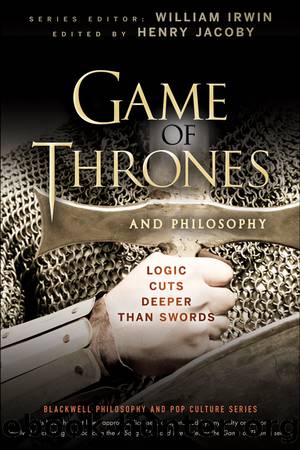Game of Thrones and Philosophy by William Irwin

Author:William Irwin
Language: eng
Format: epub
Publisher: Wiley
Published: 2012-02-01T16:00:00+00:00
Not Knowing That You Know Nothing
Ygritteâs refrain âYou know nothing, Jon Snowâ marks spaces of ignorance. In some cases, it marks a disagreement, as when Jon and Ygritte argue about whether Mance can defeat the Nightâs Watch. In others, itâs an expression of pleasure, as when Jon and Ygritte flirt and fool around. In most of the twenty or so times that Ygritte utters these words, it implies that Jon misunderstands something about wildlings. They mark Jonâs failure to be epistemically humble.
Take, for example, the exchange between Ygritte and Jon about the courting rituals between a man and a woman.2 Jon can not abide the physical taking of women by wildling raids. Ygritte argues that the man who could take her would be strong and smart, and she asks, âWhatâs bad about that?â Jon retorts that the man may never batheâYgritte says she would throw him in the river or dump water on him. What if he were brutal and beat her? Ygritte says she would kill him in his sleep. Though Jon recognizes wildlings are different, he fails to grasp the extent to which âhe knows nothing.â He doesnât know or understand the norms that govern wildlingsâ social interactions, and fails to apply this ignorance to particular judgments. He still assumes that the norms that govern wildlings should be commensurate with the norms that govern people in the Seven Kingdoms. Aware of his ignorance in the abstract, he still assumes too much in the particular.
Jon is far from alone in this problem. Samwell Tarly also assumes too much. When Small Paul comes back as a wight and attacks, Sam assumes that the dragonglass dagger will be effective. And why wouldnât it? He killed one of the Others with the dagger, and the Others turned Small Paul into a wight, so the dagger should work on wights as well. Right? And yet the dagger shatters on the armor of Small Paul, laying bare Samâs epistemic overreach.3
This comparison is a little unfair to Sam, though. Samâs decision is constrained by time, whereas Jonâs decisions are not (or at least not as much). Sam wasnât expecting the wights to show up right then and so must make a decision right now. Jonâs judgments, however, arenât needed immediately for his survival. We might excuse Sam for failing to be epistemically humbleâhe simply doesnât have the time to evaluate whether dragonglass will harm wights. Jon, however, has the time to invoke the cool calm of reflection.
Consider now how Lord Commander Mormont and others view Mance Raydar as King-beyond-the-Wall. Along with Jon, and later on, Stannis Baratheon, Mormont takes Mance to be king in the way Robert Baratheon was king. Beyond the Wall, Jon soon finds out about the dangers of homonyms. Mance Raydar may be a âking,â but he is a king of âfree men,â and so the term âkingâ has a different meaning beyond the Wall. There are no worries about speaking oneâs mind beyond the Wall, even if the king should find it offensive.
Download
This site does not store any files on its server. We only index and link to content provided by other sites. Please contact the content providers to delete copyright contents if any and email us, we'll remove relevant links or contents immediately.
Call Me by Your Name by André Aciman(18953)
Ready Player One by Cline Ernest(12828)
How to Be a Bawse: A Guide to Conquering Life by Lilly Singh(6686)
Wiseguy by Nicholas Pileggi(4582)
The Kite Runner by Khaled Hosseini(4416)
On Writing A Memoir of the Craft by Stephen King(4205)
The Crown by Robert Lacey(4099)
Audition by Ryu Murakami(4091)
Call me by your name by Andre Aciman(4065)
Harry Potter and the Cursed Child: The Journey by Harry Potter Theatrical Productions(3954)
Gerald's Game by Stephen King(3913)
The Perils of Being Moderately Famous by Soha Ali Khan(3781)
Dialogue by Robert McKee(3576)
Dynamic Alignment Through Imagery by Eric Franklin(3482)
Apollo 8 by Jeffrey Kluger(3196)
How to be Champion: My Autobiography by Sarah Millican(3181)
Seriously... I'm Kidding by Ellen DeGeneres(3098)
Darker by E L James(3086)
History of Dance, 2E by Gayle Kassing(2997)
